7667766266
enquiry@shankarias.in
Desalination
"Women and Men in India 2016" report

National Payment Corporation of India